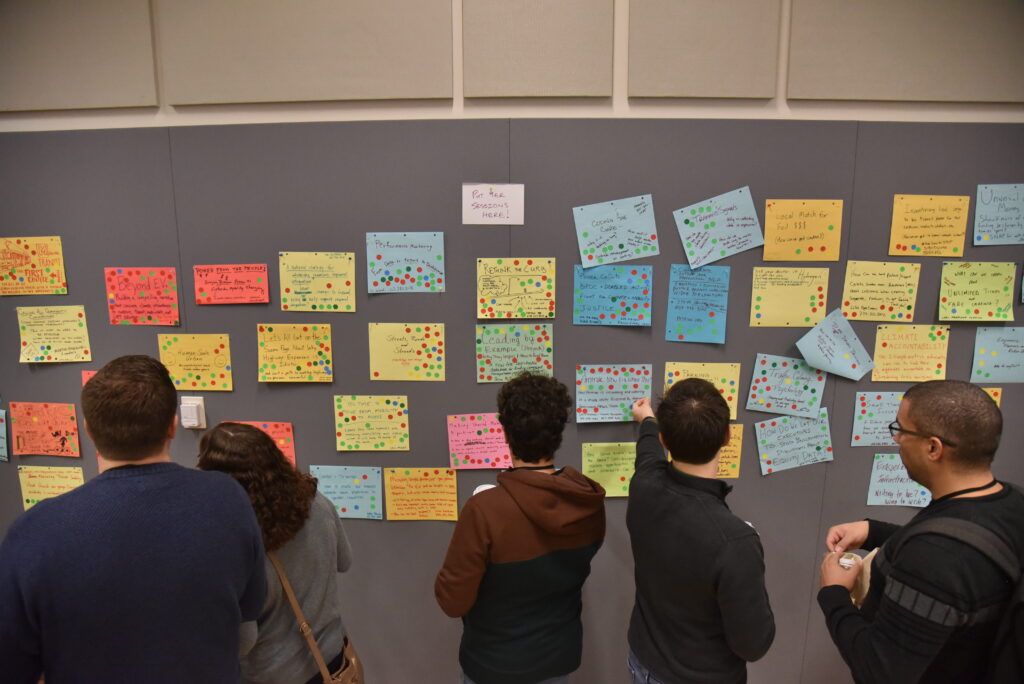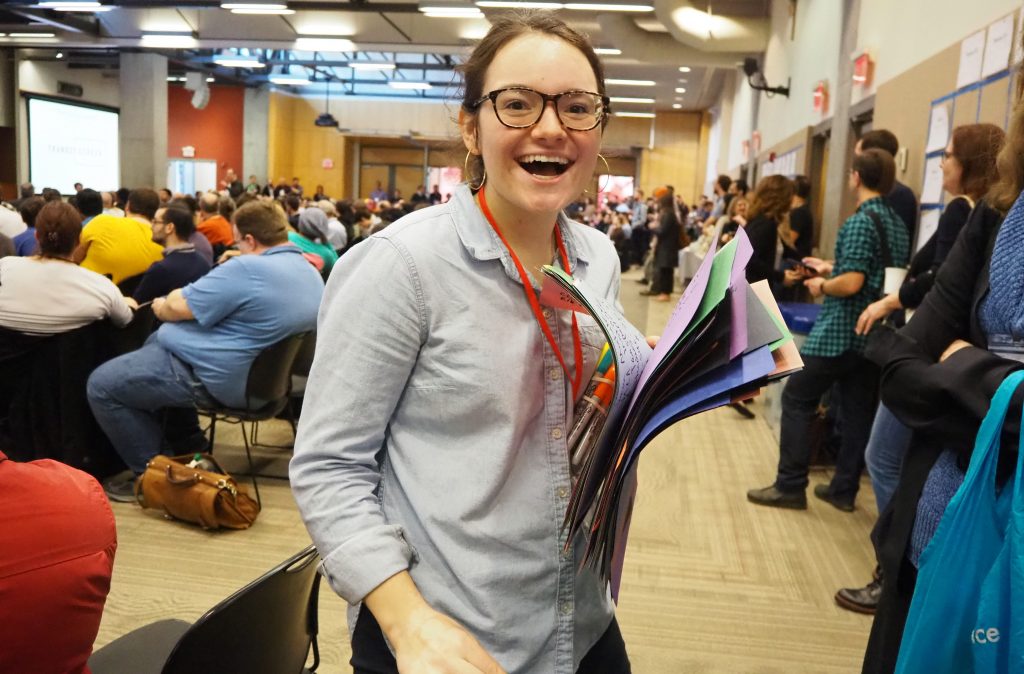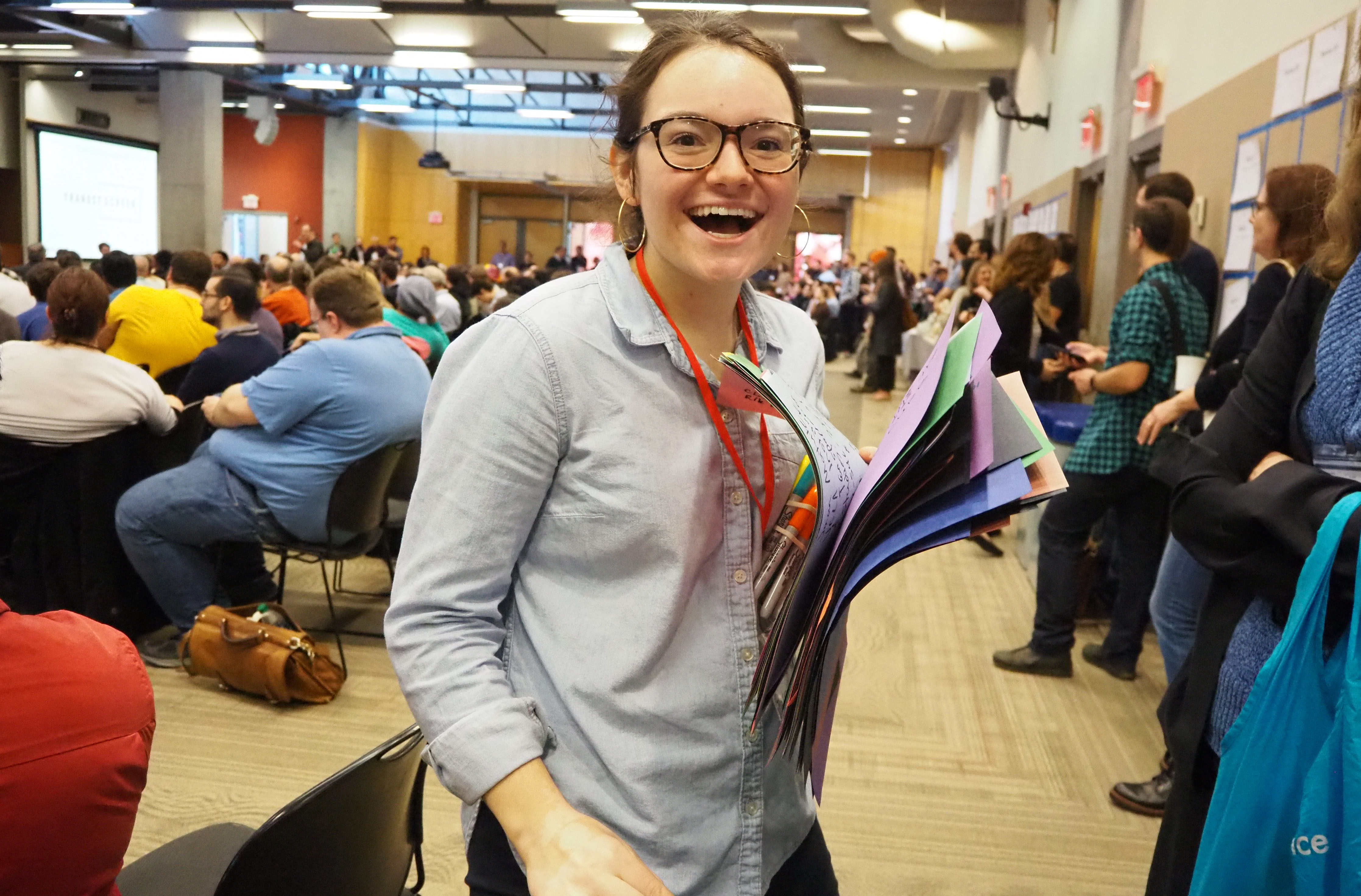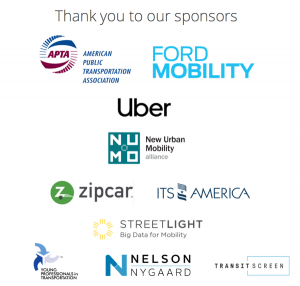
TransportationCamp DC in the rearview mirror


TransportationCamp volunteer Natasha carrying many of the 60+ session proposals that were submitted.
TransportationCamp DC 2020 was last weekend, and while it was a huge success, it almost didn’t happen at all. Last fall it was announced that the previous organizers wouldn’t be able to host it again, but at the last minute Transportation for America stepped in to make it happen—the show must go on! From the date we announced that TransportationCamp 2020 was on (November 14, 2019) there was less than two months until the actual event. But campers still turned out in big numbers.
More than 500 people were there on Saturday and the waitlist topped 100. We received many more sessions proposals than we had space for, even with 12 different breakout rooms. And topics covered everything from privacy and data in transportation apps, to fare free transit, to a how-to on transportation pilot projects. The creativity and energy on display was awesome.
Recapping such a dynamic event is a challenge, but we collected some short reflections from staff who were there to help give you a feel for what we saw and felt on Saturday if you weren’t able to attend.
Changemaking becomes a bigger focus
TransportationCamp DC 2020 was the fourth TransportationCamp I’ve attended, but the first where I felt the focus shifted from “here are all the cool developments in transportation” to taking action: “How do we make sure that transportation changes & technology benefit everybody, and how do we convince people that a future with less driving is a good idea?” Most transportation advocates/professionals could talk your ear off about the benefits of bus-only lanes, bike infrastructure, real-time transit information, and other transformative technologies that make transportation an exciting field to work in. What we need now is action to make this vision of transportation—a transportation system that actually connects everybody to jobs and services—a reality. This is a really positive development that we’ll build on next year.
– Jenna Fortunati
Equity on the agenda, but not the roster
This was my first time at TransportationCamp and I was really looking forward to listening to voices who might otherwise not make it on to a standard conference schedule. I was thrilled to see many session proposals focusing on equity. But when I looked around the (very, very full!) room, it was very white and very male. There is still lots of work to be done in transportation to be more inclusive and representative of all identities and perspectives. Earlier this year, Veronica Davis posted on twitter asking “Dear safe streets peeps… what is one thing you are going to do this year to disrupt the whiteness of the movement?” I keep thinking back to this question—and that thread, which is chock-full of great ideas—and how I can weave some of those into my own work. I’m excited to see TransportationCamp continue to grow and elevate more diverse voices.
– Mae Hanzlik
Wonky policy proposals resonate with campers
I hosted a session at TransportationCamp where we discussed the problems with traditional metrics used to assess transportation, like delay and level-of-service. Providing access between destinations (jobs, houses, grocery stores, schools, etc.) is the fundamental purpose of transportation, but narrow measures like delay don’t actually address access and obscure solutions that would improve connections as a result. At Transportation for America, we’re urging Congress to reorient our national transportation program around measuring what matters—access to jobs and services—and I was so excited to hear significant interest and support for this among the session participants! Some campers said they have been seeking to supplement or replace delay with alternatives but need guidance on what to measure. Others mentioned a need for more standardized terminology and ways of measuring access. This kind of direct feedback is invaluable and helps us better advocate for reforms at the national level.
– Rayla Bellis
Exchanging & debating ideas
The “unconference” format of TransportationCamp allows participants to get straight to what any conference is all about—exchange of ideas, and connecting with people. I participated in a session entitled “Cage Fight,” a debate about electrification versus mode shift to address the climate crisis. The initial lively debate got the blood pumping, and the serious discussion that followed generated some ideas. Participants included a few who had worked on both issues, and a member of the philanthropy community who shares our concern that donors are missing the mark by concentrating all their efforts on electric cars.
– Chris Rall
A young crowd brings high energy
Spending days in a conference space with next to no natural light and a docket of technical presentations awaiting you (i.e. most conferences) generally doesn’t get people very jazzed. But TransportationCamp was different. From 8:30 a.m. when registration opened until 5:30 p.m. people were abuzz. Making new connections, creating their session proposals, figuring out which breakouts to attend, asking questions—the energy was contagious. With affordable tickets and student discounts, TransportationCamp attracted more young passionate, optimistic, and eager folks than other conferences, though there was certainly a wide variety of ages represented. I wish more conferences had that kind of diversity.
– Sean Doyle
Hobbyists to seasoned professionals: space for everyone
I was amazed with the breadth of attendees—from mobility firms to local government staff, young and seasoned, domestic and international. Everyone demonstrated a clear desire to share and absorb new ideas and the far reaching proposals were a testament to the diverse approaches our communities need to tackle transportation issues. I also found it powerful how eager people were to make new connections, even if it was based off something simple like the 3-word phrases attendees used to introduce themselves.
– Tyler Quinn-Smith
For some of us, this was our first time at TransportationCamp while others were veterans. But after organizing a fun, energetic, and educational event we also took home a lot of lessons for next year to make TransportationCamp DC even better in 2021.
See you next year, campers.




